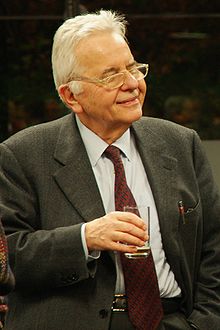Nicola Cabibbo
| Nicola Cabibbo | |
|---|---|
 |
|
| Born |
10 April 1935 Rome, Italy |
| Died | 16 August 2010 (aged 75) Rome, Italy |
| Nationality | Italian |
| Fields | Particle physics |
| Institutions |
Italian National Institute of Nuclear Physics Pontifical Academy of Sciences |
| Known for | Cabibbo angle |
| Notable awards |
Sakurai Prize (1989) Matteucci Medal (2002) Pomeranchuk Prize (2009) P.A.M. Dirac Medal (2010) Benjamin Franklin Medal (2011, posthumous) |
Nicola Cabibbo (10 April 1935 – 16 August 2010) was an Italian physicist, best known for his work on the weak interaction.
Cabibbo, son of a Sicilian lawyer, was born in Rome. He graduated in theoretical physics at the Universita’ di Roma “Sapienza University of Rome” in 1958 under the supervision of Bruno Touschek. In 1963, while working at CERN, Cabibbo found the solution to the puzzle of the weak decays of strange particles. Formulating what came to be known as Cabibbo universality. In 1967 Nicola settled back in Rome where he taught theoretical physics and created a large school with younger colleagues and brilliant students. He was president of the INFN from 1983 to 1992, during which time the Gran Sasso Laboratory was inaugurated. He was also president of the Italian energy agency, ENEA, from 1993 to 1998, and was president of the Pontifical Academy of Sciences from 1993 until his death. In 2004, Cabibbo spent a year at CERN as guest professor.
Cabibbo's major work on the weak interaction originated from a need to explain two observed phenomena:
Cabibbo addressed these issues, following Murray Gell-Mann and Maurice Lévy, by postulating weak universality, which involves a similarity in the weak interaction coupling strength between different generations of particles. He addressed the second issue with a mixing angle θC (now called the Cabibbo angle), between the down and strange quarks. Modern measurements show that θC = 13.04°.
Before the discovery of the third generation of quarks, this work was extended by Makoto Kobayashi and Toshihide Maskawa to the Cabibbo–Kobayashi–Maskawa matrix. In 2008, Kobayashi and Maskawa shared one half of the Nobel Prize in Physics for their work. Some physicists had bitter feelings that the Nobel Prize committee failed to reward Cabibbo for his vital part. Asked for a reaction on the prize, Cabibbo preferred to give no comment. According to sources close to him, however, he was embittered.
...
Wikipedia
